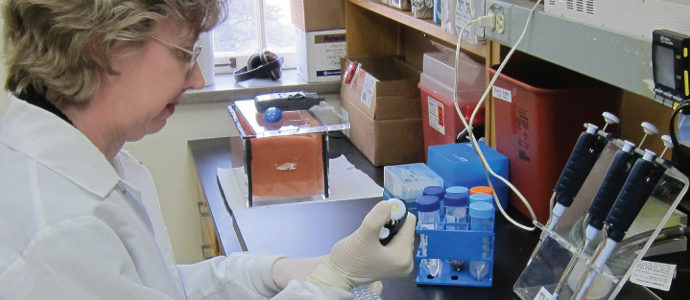With a $349,000 grant from FRAXA Research Foundation from 2008-2015, Dr. Paul Lombroso and his team at Yale University researched if inhibiting STEP could reduce behavioral abnormalities in Fragile X syndrome. Results published.
Read moreLTD (Long-term depression)
Targeting mGluR-LTD to Treat Fragile X Syndrome

With grants from FRAXA Research Foundation from 2000-2010, Dr. Kimberly Huber and her team at the University of Texas conducted several studies on the relationship between mGluR5 and Fragile X syndrome. Dr. Huber made the original discovery of the mGluR Theory of Fragile X when she was a postdoctoral fellow in the lab of Dr. Mark Bear, with her first FRAXA grant in 2000.
Read morePreclinical Evaluation of Serotonin Receptor Agonists as Novel Pharmacological Tools in Fragile X Syndrome

With a $66,000 grant from FRAXA Research Foundation in 2013, Dr. Lucia Ciranna and her team from the Universita di Catania tested if specific serotonins could reverse abnormal phentotypes found in Fragile X syndrome.
Read moreAb-Mediated Translation in Fragile X Syndrome

With a $120,000 grant from FRAXA Research Foundation during 2011-2012, Dr. Cara Westmark at the University of Wisconsin explored the role of AbPP as a potential treatment option for fragile X. AbPP produces b-amyloid which is over-expressed in Alzheimer’s disease (AD) and Down syndrome.
Read moreManipulating Basal and mGluR-Stimulated cAMP Level in FXS Model Mice

With a $90,000 grant from FRAXA Research Foundation, Dr. Hongbing Wang’s team from Michigan State University looked at a treatment target “downstream” of the mGluR5 called cyclic AMP (cAMP). Levels of cAMP are lower in FXS patients and animal models, suggesting that it plays a role in FXS. Drugs that raise levels of cAMP may effectively treat Fragile X. We are very pleased to report that, in 2012, Dr. Wang received a 5-year, $250,000 per year R01 grant from NIH to continue this promising research.
Read moreRole of the Cerebellum in the Dysfunction of Fragile X Syndrome

Correcting Fragile X Syndrome Deficits by Targeting Neonatal PKCε Signaling in the Brain Ben A. Oostra, PhD Principal Investigator Erasmus University Rotterdam, The Netherlands 2004-2005 Grant Funding: $119,000 Summary The Dutch-Belgian Fragile X Consortium led by Dr. Oostra created the
Read moreDeveloping Fragile X Treatments in Fruit Flies and Mice

With a $380,000 grant from FRAXA Research Foundation from 2005-2009, Drs. Sean McBride, Tom Jogens, and Catherine Choi studied one of the most important aspects of FRAXA’s research; the preclinical validation of potential therapeutic strategies. Many labs have found new leads for treatment. However, very few have the capacity to test new drugs in the mouse model to establish efficacy rigorously enough to lead to clinical trials. The McBride lab (in a broad collaboration with the Choi, Jongens, and Skoulakis groups) aims to do just that. Results published.
Read moreRole of FMRP Interacting Protein CYFIP1 in Prader-Willi and Fragile X Syndromes

With a $105,000 grant from FRAXA Research Foundation from 2005-2006, Dr. Yong-Hui Jiang at Baylor College of Medicine explored the relationship between Fragile X syndrome and Prader-Willi syndrome.
Read moreDrosophila CYFIP, a Molecular Link Between Actin Cytoskeleton Remodeling and Fragile X

With $130,000 in funding from FRAXA Research Foundationfrom 2004-2006, Dr. Angela Giangrande at the Universite Louis Pasteur investigated the interactions between dendrites, messenger mRNA, and the cytoskeleton in fruit flies, which are a simple yet powerful system in which multiple genes can be manipulated with relative ease.
Read morePharmacologic Interventions in the Fmr1 KO Mouse

With $48,600 in grants from FRAXA Research Foundation over 2004-2006, Dr. Catherine Choi at Drexel University studied Fragile X knockout mice to determine future treatment targets for Fragile X syndrome in humans.
Read more
